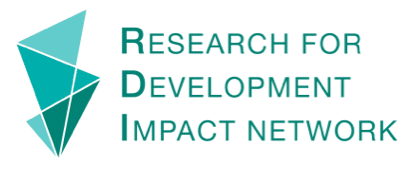Register today and get connected!
The RDI Network is a community of practice that offers international development researchers, policy makers, consultants and students the opportunity to network, share knowledge and contribute to research for development impact.
As a member, you will have access to an extensive library of research in development impact tools and resources. You'll also have priority access to initiatives and events.
To engage with resources and expertise shared by peers in the Network you are invited to register as a member.
Standard Membership
Join our dynamic community, connect with peer practitioners and academics, and access expert knowledge in your field of interest. Free I want to access expertise
- Browse resources in the Learning Hub
- Find and access expertise in your field of interest
- Engage and contribute to RDI initiatives and events
- Be kept informed of the latest research for development news, events and opportunities
- Explore content from past conferences
Expert Membership
Join our respected community of expertise, contributing through your practical and academic experience. Free I have expertise to share
- Offer your expertise and explore partnerships in research for development
- Access expertise in your field of interest
- Benefit from exclusive opportunities to inform policy and practice
- Be kept informed of the latest research for development news, events and opportunities
